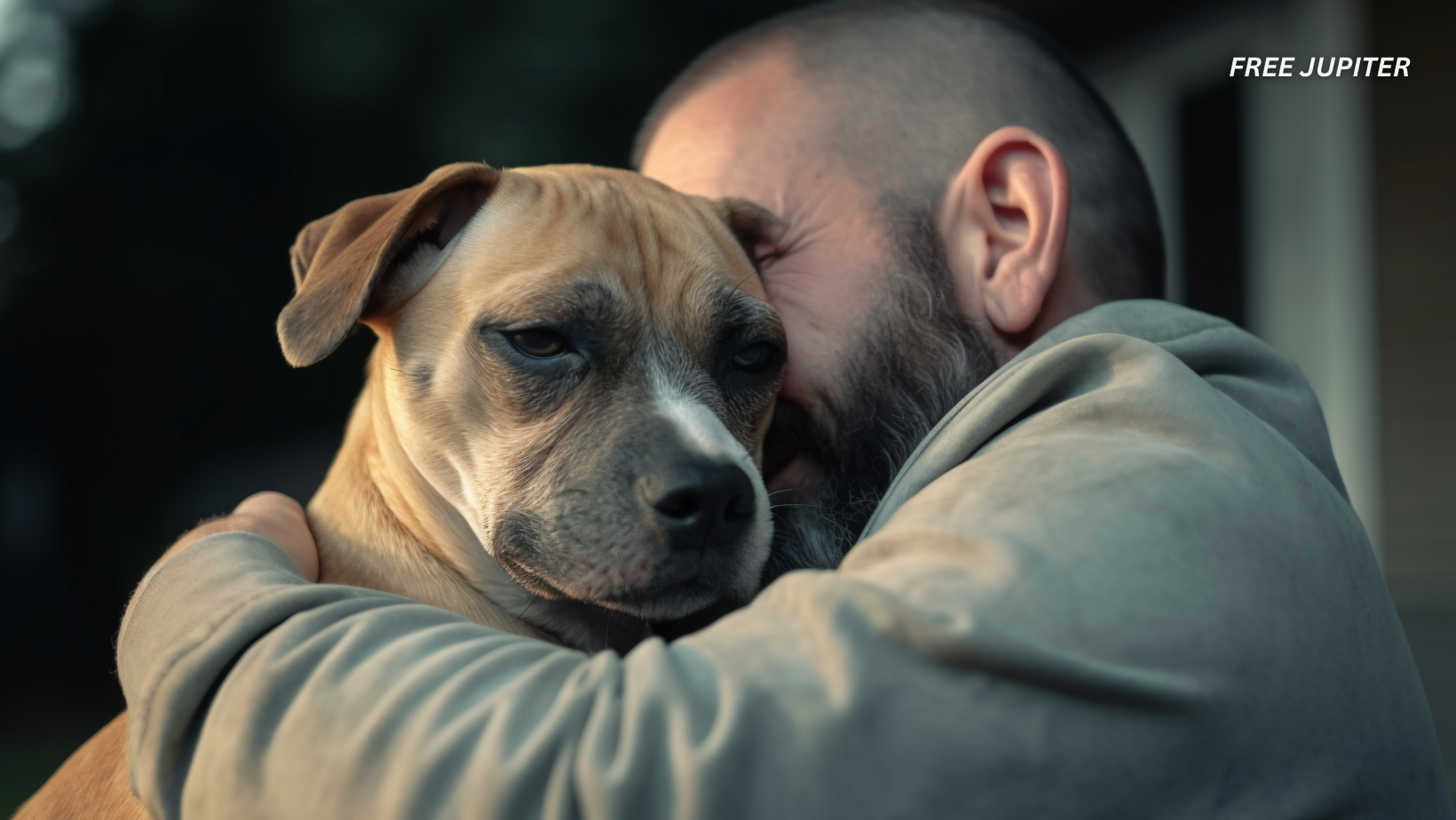Friendly Note: FreeJupiter.com shares general info for curious minds 🌟 Please fact-check all claims—and always check health matters with a professional 💙
For anyone who’s ever shared their life with a dog, saying goodbye can feel like losing a part of your soul. It’s not just the absence of a tail-wagging welcome at the door or the missing paw-taps during dinner—it’s the silencing of a relationship built on unconditional love, wordless understanding, and daily companionship. Science is catching up to what pet lovers have always known in their hearts: the death of a beloved dog can be every bit as painful as losing a human family member.
And yet, many people feel ashamed or even silly for grieving so deeply. That’s because pet loss often falls into the realm of disenfranchised grief—a form of mourning that isn’t widely acknowledged or supported. But just because it’s invisible to others doesn’t mean it isn’t real. In fact, science says otherwise.
What the Research Shows: Grief Doesn’t Discriminate by Species
Studies reveal that people who lose a pet—especially one they were deeply bonded with—can experience a grief response nearly identical to the loss of a spouse or close family member. The psychological, emotional, and even physiological symptoms can mirror those of human bereavement: sleep disruption, loss of appetite, anxiety, brain fog, and persistent sadness.
Part of this intensity comes from how humans tend to frame their relationships with pets. We often use “we” language when talking about them—“we go for walks,” “we nap together,” “we watch movies”—showing how deeply intertwined they become in our routines and emotional lives. And when that “we” becomes “I,” the pain hits hard.
Five Core Themes of Pet Loss Grief
A 2021 study published in Animals identified five recurring experiences among people grieving pets:
1. Profound Emotional Connection
The depth of grief is often tied to the closeness of the relationship. Dogs, in particular, offer consistent companionship, emotional regulation, and loyalty. They see us at our worst and love us anyway.
2. The Ethical Complexity of Euthanasia
Choosing to euthanize a pet is often the most humane choice, but it doesn’t feel that way emotionally. Owners often carry heavy guilt—even when their pet was clearly suffering. This self-blame can complicate healing.
Read more: Psychology: People Who Talk To Their Pets Like They Are Humans Display Certain Emotional Traits
3. Disenfranchised Grief and Social Isolation
When society doesn’t recognize your grief, it can leave you feeling lonely and misunderstood. People grieving a dog may not get time off work, flowers, or sympathy cards. They often mourn in silence, which can deepen emotional pain.
4. Ambiguous Loss
If a pet goes missing or is stolen, the grief becomes murky. Without closure, pet owners may oscillate between hope and despair, which is emotionally exhausting and often leads to complicated grief.
5. Coping Strategies That Help
Rituals like creating photo albums, holding memorials, journaling, or keeping a pet’s collar or ashes can provide healing touchpoints. Others seek out pet loss support groups or lean into spiritual beliefs to find peace.
Another Story: When a Dog Helps You Survive—and Then Leaves
Marine veteran Kyle Carpenter, a Medal of Honor recipient and survivor of a devastating combat injury in Afghanistan, speaks often of courage, recovery, and resilience. But when he talks about his beloved service dog, Juno, his voice takes on a deeper softness—a reverence reserved for those who have carried you through your darkest hours.
Juno wasn’t just a companion—she was a lifeline. After enduring multiple surgeries and struggling with PTSD and severe depression, Kyle found that Juno gave him something no medication or therapy session ever could: a constant, grounding presence. She accompanied him on walks when anxiety made it hard to leave the house, nudged him awake during panic attacks, and sat beside him through long, difficult nights when the world felt heavy and cold.
“She saved me in every way a dog can save a man,” he once shared in an emotional tribute. To many, that might sound poetic. But for veterans like Kyle, it’s a literal truth. Service dogs are highly trained to anticipate distress, interrupt self-harming behavior, provide physical support, and create a sense of safety that allows veterans to slowly re-enter the rhythms of civilian life. They are not just pets—they are partners in survival.
When Juno passed away at the age of 13, Kyle described it as “losing the other half of my stability.” Her absence wasn’t just a hole in his daily routine—it was the crumbling of a foundation he had built his healing upon. Without her by his side, even simple tasks became daunting again. The echo of her paws, the quiet companionship during long drives, the way she always seemed to know when he needed a friend—gone.
Read more: How Dolphins Developed the Ability to ‘See’ Underwater with Sound, Explained by Science
Beyond Kyle: A Shared Experience Among Veterans
Kyle’s story is powerful, but it is not unique. Thousands of veterans rely on service dogs for both physical and emotional recovery. Organizations like K9s For Warriors, Patriot PAWS, and Paws for Purple Hearts train dogs specifically to assist veterans struggling with PTSD, traumatic brain injuries, and the long-term psychological effects of combat.
These dogs provide structure, emotional regulation, and—perhaps most importantly—hope. For many, the presence of a service dog is the difference between spiraling into isolation and rediscovering the courage to live.
When such a dog dies, it isn’t just the end of a chapter—it’s the loss of a deeply personal support system. For veterans, especially those with minimal human networks, this grief is layered: it’s sadness, fear, vulnerability, and sometimes, the resurgence of trauma.
How Grief Shows Up in Real Life
You might find yourself instinctively reaching out in the morning to feed your dog—only to be met with silence. You might still hear their bark in your mind, or expect their weight on your lap during movie night. These phantom routines become tiny reminders of a huge absence.
Some people feel embarrassed to express this kind of grief. They may even hide their tears, afraid of being told, “It was just a dog.” But as Jon Stewart heartbreakingly admitted about his own rescue pup, “He was ready. He was tired, but I wasn’t.” Those words resonate for many—because losing a dog often means you’re left behind with more love to give and nowhere to put it.
The Road to Healing
Grief doesn’t have a timeline, and it certainly doesn’t care if your loved one had fur and four legs. Whether your way of coping involves planting a tree, creating a scrapbook, or talking to others who understand, what matters most is giving yourself permission to feel the loss fully.
If you’re supporting someone who’s grieving a pet, avoid minimizing their loss. Instead, say things like:
- “I know how much they meant to you.”
- “Tell me your favorite memory of them.”
- “They were lucky to be loved by you.”
These small acknowledgments can go a long way in helping someone feel seen.
Read more: Scientists Successfully Create Healthy Fertile Mice Using Two Male Parents
Final Thought: Love Is Love, and Loss Is Loss
In the end, grief is the cost of love. And if you’re feeling the weight of losing a dog, it simply means that you loved deeply and were loved in return.
So don’t let anyone shame you into silence. Your pain is real. Your grief is valid. And your pet—your friend, your family—was never just a dog.










